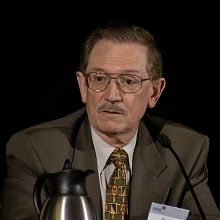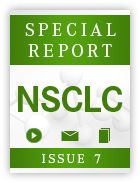On the Cutting Edge in Lung Cancer: Preview of the 16th Annual ILC Conference
Oncologists, nurses, physician assistants, pharmacists, and other healthcare professionals involved in the treatment of patients with lung cancer will gather July 2015, at the Hyatt Regency in Huntington Beach, California, for the 16th Annual International Lung Cancer (ILC) Conference.
Roy S. Herbst, MD, PhD

Roy S. Herbst, MD, PhD
The availability of successful targeted therapies, improved strategies for diagnosis and staging, molecular diagnostics to guide personalized therapy, and the recent introduction of immune checkpoint inhibitors for treatment make lung cancer one of the most rapidly evolving fields in oncology.1-3Keeping abreast of the latest developments in lung cancer requires an ongoing communication and interaction among internationally recognized leaders. Consequently, oncologists, nurses, physician assistants, pharmacists, and other healthcare professionals involved in the treatment of patients with lung cancer will gather this July at the Hyatt Regency in Huntington Beach, California, for the 16th Annual International Lung Cancer (ILC) Conference. The goal of the meeting will be to summarize the current state of the art in the treatment of lung cancer, including an assessment of novel therapeutic agents and strategies that are expected to shape future treatment of the disease.
Faculty at the meeting will include national and international experts in lung cancer who will discuss critical topics such as disease staging, molecular testing, and individualized therapy. The scientific program will consist of lectures, panel discussions, multidisciplinary tumor boards, and Q & A sessions that allow interactive discussions among participants. Clinical research from leading cooperative groups in the United States, Europe, and Asia will also be highlighted.
Scientific Program Highlights
David R. Gandara, MD

David R. Gandara, MD
The Diagnostics and Staging session on July 30 will be chaired by David R. Gandara, MD, and will feature a keynote presentation on diagnostics, staging, and functional imaging and volumetric assessment by Friedrich D. Knollmann, MD, PhD, and a presentation by Ken Y. Yoneda, MD, on optimizing diagnosis and therapy in lung cancer using endobronchial and other interventional pulmonology techniques. The same day will also feature a session chaired by Harvey I. Pass, MD, on early-stage thoracic malignancies, which will include a presentation on the current status of adjuvant therapy in nonsmall cell lung cancer (NSCLC) by Karen Kelly, MD, and a case-based panel discussion on staging and management of early-stage NSCLC.
A session on translational research in lung cancer will feature back-to-back presentations on important advances in NSCLC and small cell lung cancer (SCLC) by Paul Bunn Jr, MD, and Ravi Salgia, MD, PhD. Other highlights will include a molecular testing tumor board chaired by Roy S. Herbst, MD, PhD. The second half of the day will feature a workshop on next-generation lung cancer agents, with an overview provided by Tony Mok, MD, and presentations dealing with targeted therapies directed against oncogenesFGFR,KRAS,ROS1,TRK, andPI3K. This workshop will also feature presentations on novel interventions for lung cancer, such as HSP90 inhibitors, immunotherapies such as anti-programmed cell death-1 (PD-1) and anti-programmed cell death ligand 1 (PD-L1) agents, and polyADP ribose polymerase (PARP) inhibitors.
The Combined Modality Therapy for NSCLC Session on July 31 will feature a presentation from Everett E. Vokes, MD, on the multidisciplinary standards of care in NSCLC, and presentations on surgical advances in the treatment of locally advanced NSCLC, optimizing radiotherapy in multimodality regimens, and integrating radiotherapy into the lifelong management of patients with lung cancer. Combined modality therapy will also be considered in a case-based panel discussion.
A separate session will consider the use of immunotherapy (ie, anti-PD-1 and anti-PD-L1 agents and other checkpoint inhibitors) in NSCLC, with an overview by Herbst on the current use of immunotherapy for lung cancer in 2015. Other sessions will include individual faculty presentations on response kinetics and criteria for immunotherapies, on the development of biomarkers, on combining immunotherapies with chemotherapy and other targeted agents, on the use of checkpoint inhibitors in combined modality therapy, and on managing adverse events associated with immunotherapies. Another session will feature a case-based panel discussion on the future of immunotherapy in NSCLC.
The State of the Art session on July 31 will feature a discussion on the future of molecular testing guidelines in lung cancer presented by Fred R. Hirsch, MD, PhD, and presentations on the use of antiangiogenic agents, novel tyrosine kinase inhibitors (TKIs), next-generation epidermal growth factor receptor (EGFR) inhibitors, and first- and second-generation ALK inhibitors in lung cancer treatment. The final session of the day, chaired by Giorgio V. Scagliotti, MD, PhD, will consider some of the current challenges and opportunities in the treatment of NSCLC and mesothelioma, with faculty presentations on the pros and cons of maintenance therapy, second-line therapy and beyond, and new directions in the treatment of mesothelioma. This session will also feature a case-based panel discussion on the topic.
The August 1 program will begin with a cooperative group update, with reports from the Europe, Asia, and Alliance initiatives, as well as SWOG, NRG Oncology, NCI Canada, and Eastern Cooperative Oncology Group and the American College of Radiology Imaging Network (ECOG-ACRIN). The day’s program will also feature an interactive case-based multidisciplinary tumor board and a final session dealing with the emerging issue of personalized therapy in lung cancer treatment. This session will include presentations on molecular staging and biomarkers in the genomics era, clinical application of next-generation sequencing technologies, personalized approaches to surgical treatment, and optimizing care for special populations such as the elderly, women, and low-performance status lung cancer patients.
Anne S. Tsao, MD, is an associate professor, director of the mesothelioma program, and director of the thoracic chemo-radiation program at the University of Texas MD Anderson Cancer Center (MDACC). As one of the faculty at the meeting, Tsao will give a lecture on the use of novel therapeutic agents in early-stage thoracic malignancies. She will discuss ongoing studies or studies soon to be enrolling, including the use of nintedanib, an antiangiogenic agent, with platinum taxanes (William N. William Jr, MD, at MDACC, is principal investigator) and the use of afatinib in a window-of-opportunity trial (Kate Gold, MD, at MDACC, is principal investigator). She also cited several other studies, not fully developed as yet, that will investigate the use of immune checkpoint inhibitors in the neoadjuvant setting. On the rapidly evolving topic of using immunotherapies in lung cancer, Tsao said: “There is an event called pseudo-progression, where a patient’s cancer actually grows a bit before shrinking down. This has therefore changed the way we assess patientswe now do a 4-week confirmatory scan after an initial study shows disease growth. This is to ensure that the patient truly has disease progression. It is classified as Immune Response Criteria and is now accepted as standard practice for immunotherapy studies.”
Further information about the ILC Conference can be obtained at: http://www.gotoper.com.
References
- Khoo C, Rogers TM, Fellowes A, Bell A, Fox S. Molecular methods for somatic mutation testing in lung adenocarcinoma: EGFR and beyond.Transl Lung Cancer Res. 2015;4(2):126-141.
- Massarelli E, Papadimitrakopoulou V, Welsh J, Tang C, Tsao AS. Immunotherapy in lung cancer.Transl Lung Cancer Res.2014;3(1):53-63.
- Popper HH, Ryska A, Tímár J, Olszewski W. Molecular testing in lung cancer in the era of precision medicine.Transl Lung Cancer Res. 2014;3(5):291-300.
<<<
